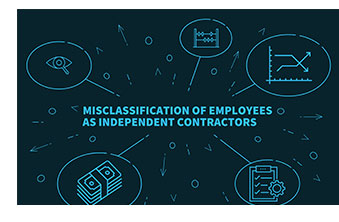| |
THIS ISSUE'S HEADLINES
The U.S. Department of Labor Issues New Rules Distinguishing Employees From Independent Contractors
Protecting Business Assets: The Importance of Prenuptial and Postnuptial Agreements for Business
Owners in Rhode Island
Conflict of Interest Policies: A Refresher
Preparing the Next Generation of a Family-Owned Businesses

THE U.S. DEPARTMENT OF LABOR ISSUES NEW RULES DISTINGUISHING EMPLOYEES FROM INDEPENDENT CONTRACTORS
 In order to discourage the misclassification of workers, federal law and the laws of many states provide for significant civil fines and sometimes other sanctions for employers who misclassify workers. Last January, the U.S. Department of Labor issued final regulations modifying its existing rule for classifying service providers as either employees or independent contractors. Those rules became effective on March 11, 2024. In order to discourage the misclassification of workers, federal law and the laws of many states provide for significant civil fines and sometimes other sanctions for employers who misclassify workers. Last January, the U.S. Department of Labor issued final regulations modifying its existing rule for classifying service providers as either employees or independent contractors. Those rules became effective on March 11, 2024.
The new regulation provides a six (6) factor test, which PLDO Partner William F. Miller discusses in a Client Advisory that can be accessed by clicking here.
If you have any questions or would like further information, please contact Attorney Miller of our Corporate and Business Practice at 508-420-7159 or wmiller@pldolaw.com.
[back to top]

PROTECTING BUSINESS ASSETS: THE IMPORTANCE OF PRENUPTIAL AND POSTNUPTIAL AGREEMENTS FOR BUSINESS OWNERS IN RHODE ISLAND
 In the realm of marriage, the concept of prenuptial and postnuptial agreements often stirs mixed emotions. Some view them as cold and unromantic, while others see them as practical and necessary. In Rhode Island, where business ownership is prevalent and families often seek to safeguard their assets, these agreements serve as indispensable tools, particularly for business owners, offering a layer of protection and certainty in both marital and estate planning matters. In the realm of marriage, the concept of prenuptial and postnuptial agreements often stirs mixed emotions. Some view them as cold and unromantic, while others see them as practical and necessary. In Rhode Island, where business ownership is prevalent and families often seek to safeguard their assets, these agreements serve as indispensable tools, particularly for business owners, offering a layer of protection and certainty in both marital and estate planning matters.
For entrepreneurs and business proprietors in Rhode Island, the stakes are high. Their ventures represent not just financial investments but also a lifetime of dedication, hard work, and vision. Therefore, it is essential to consider how marital agreements can shield these assets from the uncertainties of divorce or death.
Prenuptial agreements, entered into before marriage, allow couples to outline the division of assets, debts, and income in the event of divorce or death. Postnuptial agreements, though signed after marriage, serve a similar purpose. Both agreements provide a clear framework for asset distribution, minimizing conflicts and uncertainties during potentially contentious times.
For business owners, these agreements offer specific benefits. They can designate the ownership and management of the business, delineate the treatment of business assets acquired during the marriage, and establish protocols for the valuation and division of the business in the event of divorce or death. This clarity not only protects the interests of the business but also ensures its continuity and stability, benefiting not just the owners but also employees and stakeholders.
Moreover, prenuptial and postnuptial agreements play a crucial role in estate planning. They complement wills, trusts, and other estate planning tools by providing an additional layer of protection for business assets. By addressing potential conflicts beforehand, these agreements can prevent costly legal battles and ensure that the wishes of the deceased are carried out smoothly and efficiently.
When issues with prenuptial agreements arise, it is important for business owners to know that if the agreement is properly drafted according to the standards set by state law, it is almost impossible to nullify in court. In fact, Rhode Island has some of the toughest legislature when it comes to challenging and nullifying prenuptial agreements. The Courts place a significant burden upon the party seeking to render the agreement unenforceable to provide “clear and convincing evidence” that the agreement was both involuntary and unconscionable. “15-17-6 (b). Essentially, this can provide an extra layer of protection for Rhode Island business owners.
In conclusion, prenuptial and postnuptial agreements are indispensable tools in the toolbox of estate planning attorneys in Rhode Island. They empower couples to take control of their financial futures, safeguard their hard-earned assets, and ensure the long-term viability of their businesses. By addressing potential challenges proactively, these agreements foster peace of mind and strengthen the foundation of marriages and businesses alike. If you have questions regarding prenuptial and postnuptial agreements as part of your estate and business succession plan, please contact PLDO Partner David P. Craven, Esquire at 401-824-5100 or email dcraven@pldolaw.com.
[back to top]

CONFLICT OF INTEREST POLICIES: A REFRESHER
 A conflict of interest policy is a set of procedures that help corporate decision makers identify potential conflicts of interest and reduce the likelihood that persons in a position of authority over an organization may use their authority to receive an inappropriate benefit. It is an official document aimed at protecting a corporation’s interests when entering into an arrangement that might directly or indirectly benefit the private interest of a board member or officer. A conflict of interest policy is a set of procedures that help corporate decision makers identify potential conflicts of interest and reduce the likelihood that persons in a position of authority over an organization may use their authority to receive an inappropriate benefit. It is an official document aimed at protecting a corporation’s interests when entering into an arrangement that might directly or indirectly benefit the private interest of a board member or officer.
These policies often arise in the context of non-profit corporations that have tax exempt status due to the Internal Revenue Service’s stringent requirements. The IRS has stated that tax exempt “organizations will lose their tax-exempt status unless they operate in a manner consistent with their charitable purposes. Serving private interests more than insubstantially is inconsistent with accomplishing charitable purposes.”
It is a best practice for all business entities, regardless of tax-exempt status, to have a conflict of interest policy in place. While the law in certain states set out the bare bones requirements, it is advisable to have a robust policy for the multitude of reasons discussed in this article.
First and foremost, corporate directors and officers have certain fiduciary duties to the corporation they serve. One of the most important fiduciary duties is the duty of loyalty, which requires a corporate director or officer to be solely loyal to the corporation’s interests. For example, if a director engages in self-dealing by entering into a corporate contract for services with an entity the director owns, that director may be breaching their fiduciary duty and causing harm to the corporation in the form of the corporation paying too much for a service or losing out on another, more advantageous opportunity. A conflict of interest policy addresses situations like this before a problem ever arises. From a practical standpoint, this creates clear expectations and will provide a roadmap for decision makers in the event of a conflict.
From a more global standpoint, a conflict of interest policy is similarly important and can help to build a corporation’s reputation and public trust. These days, consumers in virtually every industry are calling for transparency, especially in the context of publicly traded companies. A conflict of interest policy can help to protect your business by avoiding the appearance of impropriety and ensuring best practices are followed at every stage of corporate decision making.
If you have questions or would like further guidance on conflict of interest policies, please contact Attorney Paige E. Macnie at 401-824-5100 or pmacnie@pldolaw.com.
[back to top]

PREPARING THE NEXT GENERATION OF A FAMILY-OWNED BUSINESSES
 In prior articles, we have discussed the importance of succession planning in family-owned businesses, which requires careful planning and adaptation. In order for the business to thrive under the next generation, the family must be committed to professionalizing the operation, which generally involves adopting more formal processes, standards and governance structure. One method of jump-starting this process is to seek outside counsel and professionals to provide an objective evaluation of the operation and the successor’s ability to operate the business. In prior articles, we have discussed the importance of succession planning in family-owned businesses, which requires careful planning and adaptation. In order for the business to thrive under the next generation, the family must be committed to professionalizing the operation, which generally involves adopting more formal processes, standards and governance structure. One method of jump-starting this process is to seek outside counsel and professionals to provide an objective evaluation of the operation and the successor’s ability to operate the business.
Technological advancements are a reality that must be accepted and implemented by most businesses. In a family business, it is important to remain agile and be willing to adopt new methods, invest in innovation and adapt to a changing business environment. Introducing new ideas, products, or methods to improve performance is an ongoing process for any company, but it can be especially challenging when family members have different opinions regarding innovation.
The ability to adjust and adapt to market conditions that may be different than what former generations encountered requires strong leaders who are willing to develop new strategies to become more efficient by either expanding or restricting operations. Investing in technology can create opportunities to improve efficiencies and increase the competitive advantage of a family-owned business.
The business world that now exists is much different than ten or twenty years ago in that consumers and/or investors are more inclined to value the sustainability of the business and are more sensitive to ethical values and business practices. The next generation of the family-owned business have an opportunity that may not have existed by their parents or grandparents to leverage community ties, while at the same time, implementing practices that are more sustainable in a competitive environment.
Another challenge facing the next generation of ownership is addressing conflicting views regarding the operation, marketing methods and overall management of the business. Personal relationships may cause conflict that - without resolution - will negatively impact the overall business strategy. Dealing with this challenge upfront by defining the roles of family members, developing clear policies and a mechanism for conflict resolution is critical.
For the next generation to succeed in running the family business, the leader(s) must be willing to recognize weaknesses, strengths and opportunities from an objective point of view. Again, this may require the expertise of unbiased, non-family members. Preserving the family unit while, at the same time, driving the business to new levels is a constant balancing act and essential to overall success. If you have questions or would like further information, please contact PLDO Principal Gary R. Pannone at 401-824-5100 or email gpannone@pldolaw.com.
[back to top]
|
 |





